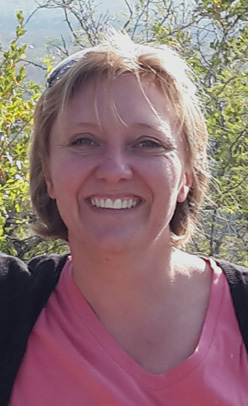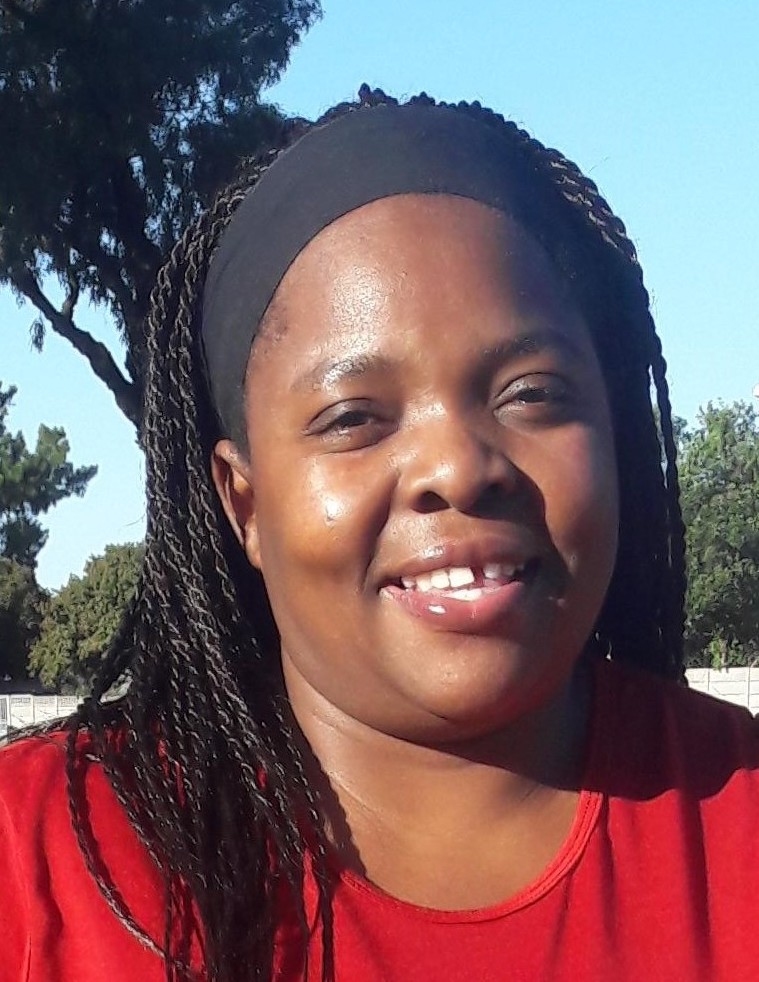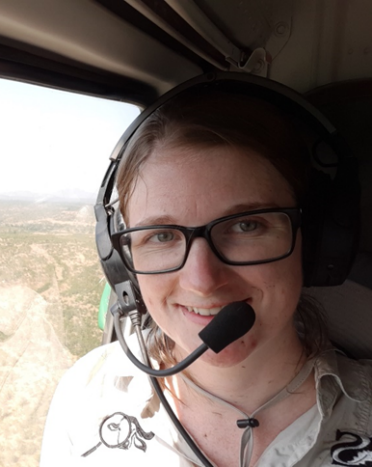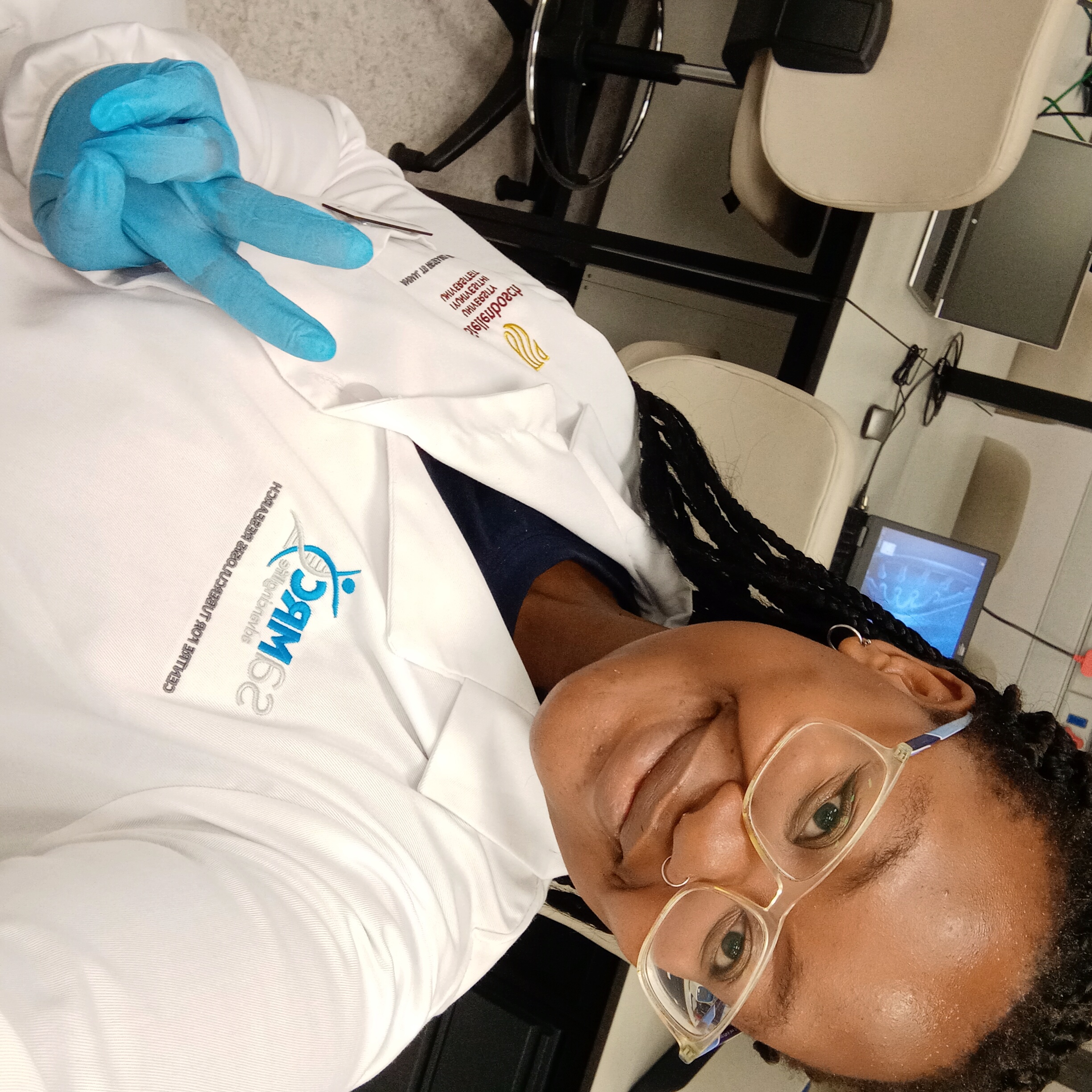Animal TB Research Group
POSTDOCTORAL RESEARCH FELLOWS

Dr Megan Matthews
Postdoctoral Research Fellow
megandutoit@sun.ac.za




Megan is a molecular biologist with a keen interest in pathogen diagnostics. She completed a BSc and an honors degree in Microbiology at Stellenbosch University. She then went onto complete a MSc and PhD in Agriscience. Her PhD focused on investigating the genetic diversity and novel diagnostics of the fungal pathogen Foc TR4. She joined the Animal TB Research Group in 2023 as a postdoctoral researcher focusing on TB in buffalo and the detection of environmental Mycobacteria. She loves nature, animals, and the outdoors. In her free time, she enjoys running, cooking, gardening, and spending time with her husband and two cat babies.

Dr Abisola Okunola
Postdoctoral Research Fellow
aokunola@sun.ac.za




Abisola completed his BSc in Medical Laboratory Science and MSc in Biomedical Science from Nigeria and UK in 2010 and 2014 respectively. He obtained his PhD from Stellenbosch University in 2020. He joined the Immunology TB diagnostic group for his postdoctoral research in 2021, before joining the Animal TB Research Group in 2022. His research within the group focuses on investigating the intra and inter-species transmission of M. bovis in wildlife. Abisola enjoys listening to music and spending time out with friends and family.
DOCTORAL STUDENTS
 Debbie Cooke
Debbie Cooke
PhD candidate
dmcooke@sun.ac.za

Debbie has been working as an Animal Health technician for the Department of Agriculture's Veterinary Services since 1997 and has been stationed at the Veterinary Epidemiology unit for the last 15 years. She completed her MSc in Mycobacterium avium in free-ranging poultry in 2017 and has joined the Animal TB Research Group in 2020. Her PhD project focuses on TB in goats in South Africa. She is evaluating the tuberculin skin test as well as blood-based assays to improve the diagnosis of TB in goats. Since there is limited information regarding TB in this species in South Africa, this data will improve understanding of this disease and provide information to goat owners and animal health regulatory agencies for surveillance and control of bovine TB in this species. In her free time, which is limited (not easy being a PhD student AND employed full time!), she enjoys woodwork, gardening, and painting.

Rachiel Gumbo
PhD candidate
rachy@sun.ac.za



Rachiel graduated with a BSc Honours in Biological Sciences from Midlands State University in Zimbabwe where she majored in Genetics and Industrial Microbiology. She went on to work, first as a lab assistant at Hwange Colliery Hospital Laboratory (Zimbabwe) and then as a teacher, before joining the Animal TB Research Group in 2019 as an honours student. Rachiel's study focuses on identifying host and pathogen biomarkers that can be used to detect M. bovis infection in African lions, cheetahs, and leopards in bovine TB-endemic populations. This research will improve the diagnosis of bTB in African big cats, which will hopefully minimize the risk of disease spread during the translocation of animals between fragmented populations.

Rebecca Dwyer
PhD candidate
radwyer@sun.ac.za



Rebecca joined the Animal TB Research Group in 2020; her MSc project focused on the identification of immunological biomarkers to be applied for diagnostic testing for M. bovis in African rhinoceros, as well as an in-depth examination of the epidemiology of the disease in these animals. She upgraded her MSc to a PhD and continues to focus on the development of direct detection (including mycobacterial culture and molecular methods) techniques for MTBC in African rhinoceros, identification of immunological biomarkers to be applied for diagnostic testing for M. bovis in African rhinoceros, an in-depth examination of the epidemiology of the pathogen in these animals.

Stacey Engel
PhD candidate
engels@sun.ac.za


Stacey graduated with a BSc Honours and MSc in Molecular Biology, before joining the Animal TB Research Group in 2023 as a PhD Student. Stacey's project aims to better understand the immune response of African elephants (Loxodonta africana) using a transcriptomic approach which may then further be applied in disease-specific conditions to better understand the immune response to diseases such as TB or EEHV in African elephants and fill the gaps noted in literature.
MASTERS STUDENTS
 Sinegugu Kholeka Mhlophe
Sinegugu Kholeka Mhlophe
MSc candidate
smhlophe@sun.ac.za

Leka's love for animals led her to join the Animal TB Research Group for her MSc. Her project aims to advance the diagnosis of Mycobacterium bovis in African buffalo (Syncerus caffer). African buffaloes are an important maintenance host for M. bovis, meaning that they get infected and remain infected for months and even years before succumbing to the disease. Their gregarious and migratory nature means that they interact with numerous other wildlife species, thus spreading disease. Developing culture-independent diagnostic tools will not only lead to a faster and more accurate diagnosis but ultimately help to prevent its spread, strengthening disease control efforts.

Maureen Kamau
MSc candidate
mkamau@sun.ac.za
Maureen is a wildlife veterinarian and researcher in Kenya, currently pursuing an MSc in molecular biology with the Animal TB group and a veterinary research fellow with the Smithsonian Institute's Global Health Program based Mpala Research Centre in Laikipia County in Central Kenya. For her MSc, Maureen is working on detecting DNA detection of Coxiella burnetii from ticks at watering holes in Laikipia County in Central Kenya using in situ DNA extraction and a hand-held portable thermocycler. She is also the field leader of the Remote Emerging Disease Intelligence Network (REDINET) project in Kenya. In her spare time, she enjoys spending time with friends, listening to podcasts and reading books .
HONOURS STUDENTS
 Shanae Meadows
Shanae Meadows
BSc Hons candidate
smeadows@sun.ac.za

Shanae joined the Animal TB Research Group as an Honors student for 2023. Shanae will be evaluating the use of Sarlorn Stabilization Transport Medium (SSTM), which both stabilizes proteins and nucleic acids and inactivates pathogens to determine how it may impact downstream assay performance using White Rhinoceros blood samples.

